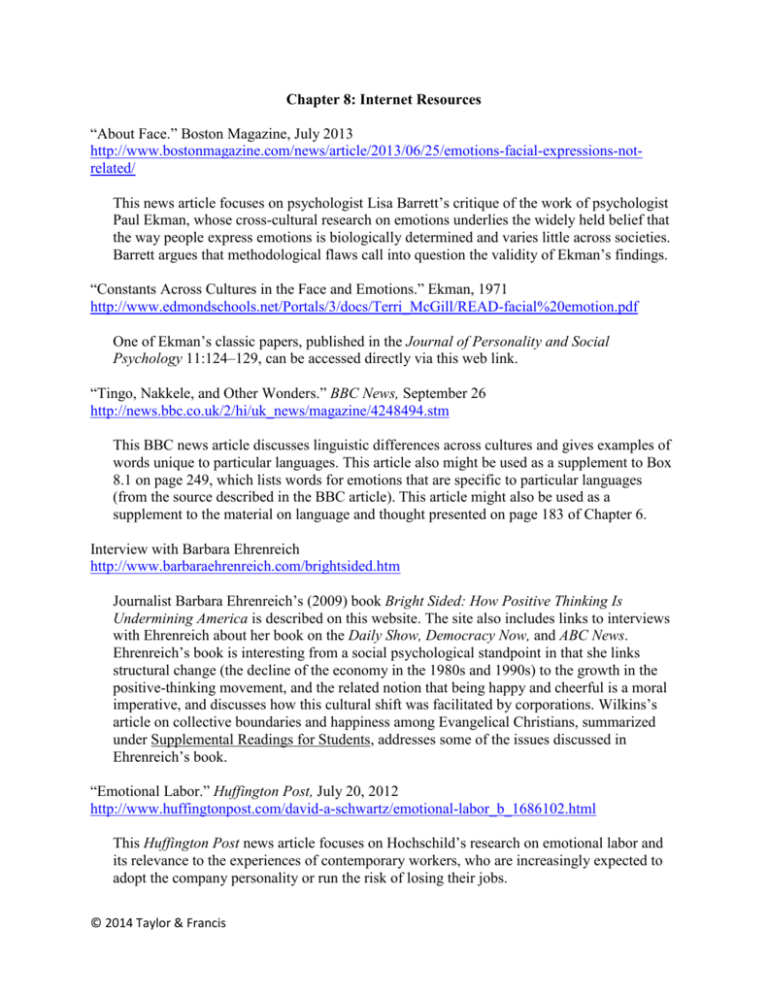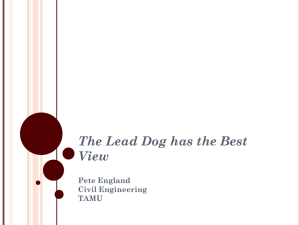Chapter 8: Internet Resources “About Face.” Boston Magazine, July
advertisement

Chapter 8: Internet Resources “About Face.” Boston Magazine, July 2013 http://www.bostonmagazine.com/news/article/2013/06/25/emotions-facial-expressions-notrelated/ This news article focuses on psychologist Lisa Barrett’s critique of the work of psychologist Paul Ekman, whose cross-cultural research on emotions underlies the widely held belief that the way people express emotions is biologically determined and varies little across societies. Barrett argues that methodological flaws call into question the validity of Ekman’s findings. “Constants Across Cultures in the Face and Emotions.” Ekman, 1971 http://www.edmondschools.net/Portals/3/docs/Terri_McGill/READ-facial%20emotion.pdf One of Ekman’s classic papers, published in the Journal of Personality and Social Psychology 11:124–129, can be accessed directly via this web link. “Tingo, Nakkele, and Other Wonders.” BBC News, September 26 http://news.bbc.co.uk/2/hi/uk_news/magazine/4248494.stm This BBC news article discusses linguistic differences across cultures and gives examples of words unique to particular languages. This article also might be used as a supplement to Box 8.1 on page 249, which lists words for emotions that are specific to particular languages (from the source described in the BBC article). This article might also be used as a supplement to the material on language and thought presented on page 183 of Chapter 6. Interview with Barbara Ehrenreich http://www.barbaraehrenreich.com/brightsided.htm Journalist Barbara Ehrenreich’s (2009) book Bright Sided: How Positive Thinking Is Undermining America is described on this website. The site also includes links to interviews with Ehrenreich about her book on the Daily Show, Democracy Now, and ABC News. Ehrenreich’s book is interesting from a social psychological standpoint in that she links structural change (the decline of the economy in the 1980s and 1990s) to the growth in the positive-thinking movement, and the related notion that being happy and cheerful is a moral imperative, and discusses how this cultural shift was facilitated by corporations. Wilkins’s article on collective boundaries and happiness among Evangelical Christians, summarized under Supplemental Readings for Students, addresses some of the issues discussed in Ehrenreich’s book. “Emotional Labor.” Huffington Post, July 20, 2012 http://www.huffingtonpost.com/david-a-schwartz/emotional-labor_b_1686102.html This Huffington Post news article focuses on Hochschild’s research on emotional labor and its relevance to the experiences of contemporary workers, who are increasingly expected to adopt the company personality or run the risk of losing their jobs. © 2014 Taylor & Francis “Privileged Emotion Managers: The Case of Actors.” David Orzechowicz http://www.asanet.org/journals/spq/actors.cfm This video lecture, available via the American Sociological Association’s website, focuses on how theater facilitates emotion management. The presentation is given by sociological social psychologist David Orzechowicz, who discusses his 2008 study on this topic, “Privileged Emotion Managers: The Case of Actors” (Social Psychology Quarterly 71:143–156). ASA Emotions Section http://www2.asanet.org/emotions/index.html The American Sociological Association’s Sociology of Emotions section homepage, directly accessible via this web link, provides access to section newsletters, which include descriptions of recent publications in the field, book reviews, and summaries of awardwining student research projects on emotions. Sociology of Emotions, Open University of Catalonia http://socioemo.wordpress.com/ This blog on the sociology of emotions, written by three sociologists from the Open University of Catalonia, includes an interesting post about Lady Gaga and the blurring of private and public spheres of emotional life (“Introspective Extimacy: Lady Gaga and the Consumption of Emotions”). This theoretical analysis of Lady Gaga’s emotional engagement with fans should facilitate the cultivation of a more critical orientation toward the media among students, especially those familiar with Lady Gaga’s public persona, and help them to see the relevance of sociological social psychology to everyday life. © 2014 Taylor & Francis








